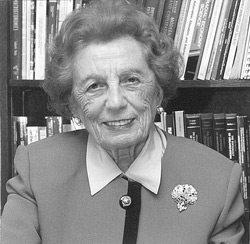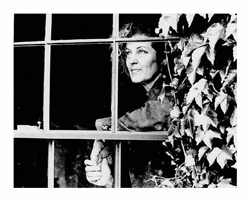
|

|
| | |
| | VOLUME 30, NUMBER 8 | WEDNESDAY, NOVEMBER 3, 1999 | ISSN 1199-5246 | | |
| | ||
|
|
By Susan Scott To honour former prime minister Pierre Trudeau's 80th birthday last month, the University has endowed a $75,000 Pierre Elliott Trudeau Fellowship. Each year, an exemplary graduate student doing research in the humanities or social sciences will receive $3,750. The endowment was established from the proceeds of the sales of 100 special edition, leather-bound numbered copies of The Essential Trudeau, edited by Ron Graham and published by McLelland & Stewart. The books, each priced at $1,000, were signed by Trudeau last year during a conference at York called "The Trudeau Era: Culture, Media and Politics." The book contains a selection of excerpts from Trudeau's writings, speeches and interviews - many appearing for the first time in book form, featuring introductory notes to each chapter, and occasional commentary by Trudeau. He served as prime minister from April 1968 to June 1979, and again from March 1980 to June 1984. The fellowship is intended to assist research essential to the completion of graduate work by supporting expenses such as travel, archival and library research in Canada and abroad. Avie J. Bennett, York University chancellor and chairman of McClelland & Stewart said Trudeau expressed his pleasure that the award bearing his name would assist graduate students in the pursuit of understanding and uncovering issues in humanities and social sciences.
Gary J. Smith, York's vice-president (university advancement) said, "It seems appropriate that each year the University will be able to offer research assistance to | |
|
|
By Chris Stewart and Roman Koniuk The term has well and truly begun, and mid-terms are upon us. Students are pulling all-nighters, teaching assistants are marking 24-7. Perhaps you're one of these, or a faculty member in the midst of a bout of insomnia due to Post Sabbatical Stress Disorder. Regardless - you're awake, and it's late. You could wander outside and gaze up at the night sky, find the soft glow of the Milky Way, spot a few constellations, watch for shooting stars. You could do that...except it's raining. No star gazing tonight. Fortunately, you can still do some astronomy, right there in the living room. It's so late, there's nothing on TV, not even old "Gilligan's Island" reruns. But turn on the television anyway, and watch the static fuzz, listen to that "shhhhh". Mesmerising, isn't it? That static is stray electromagnetic waves picked up by your television's receiver. Some of it is from all the electronics, power lines and so on surrounding us in this modern world. But one third of the static is coming from beyond our world, from cosmic background radiation (CBR) over15 billion years old. Way back in time, well before Gilligan, before life on Earth, before even the Earth existed, in fact just 700,000 years after the Big Bang itself, atoms first came into being. Before that moment in history, when the universe was still very hot, space was filled with electrons, protons and neutrons (the particles that make up atoms) and photons (particles of light). It was too hot for these elementary particles to form into atoms, because at high temperatures, they are colliding far too violently to stick together. So all the particles were mixed together into a kind of hot, cosmic soup. But the soup was cooling quickly, and it wasn't long before it cooled enough to allow atoms to form. Suddenly, where there had been a universe of particle soup, there was a universe full of atoms - hydrogen atoms mainly, they're the easiest to make, though there was some helium too. Even today, billions of years later, our universe is still made up almost completely of hydrogen and helium. All the other elements we find around us, like oxygen and carbon and iron, seem pretty important to us, only constitute a tiny fraction of all matter in existence. In fact, essentially everything in the universe other than hydrogen and helium was created much later, by nuclear reactions inside stars. In a very real sense, we are all star dust. And so, 700,000 years after the Big Bang, space quite abruptly became filled with atoms. As far as the photons were concerned, it was as if the universe suddenly became transparent, like glass. All of the photons, that had moments before been bouncing against all the electrons and protons in the cosmic soup, could now roam the heavens freely. We call these photons cosmic background radiation. So, watching the static on your TV screen, a third of those random dots mark the death of a photon, a photon that has travelled for billions of years, since that moment in time when the stuff of the universe cooled enough for atoms to form. You sit there, bathed in the glow from the television, comforted by these messengers from the distant past. The rain has stopped now, so you wander out into the cool night air. A little mist plays around the pale streetlights, a sultry jazz phrase wafts down the street from someone's open window. Overhead, the clouds have parted, and you can see a thousand burning stars, stars that formed long after the CBR photons began their journey. You can't see those photons with your own eyes, but the cosmos is filled with them. You know, because you saw them on TV. And they say there's nothing worth watching on television.
Chris Stewart is a doctoral student in physics and astronomy and Roman Koniuk is Chair of the Physics and Astronomy Department.
| |
|
|
* One thousand people, $2,000 and over 5,000 pancakes are what it takes to have a successful pancake breakfast. In total York University raised $2,068 at two separate breakfast locations (Central Square and Glendon cafeterias) to kick-off the 1999 United Way Campaign in style, and beat Ryerson in the process. In a friendly competition York edged out Ryerson which raised over $1,600. * Anyone with recipes for the United Way Cookbook should send them to Dawn Burns at dburns@yorku.ca. * Don't forget a donation to the Streb Naked-Head fund!
| |
|
|
By Kyle Byron York's 40th anniversary Fall convocation will be held on Friday Nov. 5 and Saturday, Nov. 6, with two ceremonies each day. Along with the 2,000 graduates receiving degrees, York will present four members of the education community with honorary doctorates. The recipients are Golda Koschitzky, Manfred Erhardt, Germaine Greer and Francesca Valente.
Golda Koschitzky is the matriarch of one of Canada's leading philanthropic families. The Koschitzkys are internationally recognized for their humanity and civic-mindedness. Education is paramount in the Jewish tradition and in 1996 the Israel Koschitzky Family Charitable Foundation made a contribution of $600,000 to York University. The donation funded the establishment of a Professorship in Jewish Teacher Education. In November 1998 the Koschitzky family donated a second $600,000 to establish a Chair in Jewish Teacher Education. The gift has ensured that York's program is one of the most innovative and qualified in the country. Manfred Erhardt holds many offices including the rank of Lieutenant in the German reserves, and has a doctorate of laws. From 1969 he has advised the German ministers of Education, and the state councils of Science and Art in Baden-Württemberg. Through his educational work in the 1980s, he was instrumental in establishing the Ontario/Baden-Württemberg academic partnership and student exchange program. York and its affiliate Konstanz were the operating headquarters for the program for its initial five years. From 1991-1996 Erhardt was the senator (minister) of Science and Research for the state of Berlin. In his tenure, he oversaw the reform of the Humboldt-Universitõt. In 1996 Erhardt volunteered to lead the Donors' Association for the Promotion of Science and Humanities and currently holds that position. This agency is responsible for reforming the university system, its international relations, higher standards of education and research, and communication with the public and private sectors.
Germaine Greer is a world renowned author of feminist theory. Recently named Professor of Comparative Literary Studies at the University of Warwick, Greer has been lecturing at the universities of Tulsa and Warwick since 1967. She is the founder and director of the Tulsa Center for the Study of Women's Literature. Of her dozens of publications, perhaps the most notable are The Female Eunuch (1969), The Obstacle Race: The Fortunes of Women Painters and Their Work (1979), Daddy, We Hardly Knew You (1989) and The Change: Women, Ageing and the Menopause (1991). Her works The Female Eunuch and The Obstacle Race: The Fortunes of Women Painters and Their Work brought her fame in and outside of feminist circles. The Change: Women, Ageing and the Menopause has been translated into 13 languages, as have many of her works. Daddy, We Hardly Knew You was awarded the J.R. Ackerly Prize and the Premio Internazionale Mondello. Greer is a monumental force in feminist theory, the humanities and the social sciences. Francesca Valente is the former director of the Italian Cultural Institute in Toronto and Vancouver (1993-1998). Among her numerous awards are the British Council Fellowship in Applied Linguistics and a Fellowship in the Canadian Council ‹ Italian Ministry of Foreign Affairs. She has been recognized by the mayors of Vinci, San Francisco and Toronto for her work in Italian cultural dissemination. An author of publications and scholarly journals, she has translated works by Margaret Atwood, Northop Frye, Marshall McLuhan and Italian poets such as Giorgio Bassani and Patricia Cavalli. She was the project director of The Fountain of Italy by Enzo Cucchi for York University in 1993. She is currently with UNESCO (United Nations Educational, Scientific and Cultural Organization) as a consultant with the Ministry of Foreign Affairs for Rome. For information on Fall Convocation 1999, call the hotline at (416) 736-5138, visit the office at 104 Central Square, or visit the Web site at www.yorku.ca/admin/sa/convo/index.htm.
| |
|
|
As York celebrates its 40th anniversary this year, plans are already underway to begin preparing a scholarly history of the University to mark its 50th anniversary. To ensure this history is completed on time, work needs to start soon. As part of the preparation of a University history, the requisite policies and procedures must be put in place to ensure the acquisition and preservation of the University's archival records. The University archivist is working on this part of the project in collaboration with other constituencies on campus. In addition, there is a recognition that while the University is relatively young, its founders (faculty, staff and students) may not be available to celebrate the 50th anniversary, or to tell their story. One of the first steps in accomplishing the writing of this history is to select a historian from the York faculty as soon as possible. Any York faculty who may be interested in being responsible for coordinating the preparation, research and writing of York's history are encouraged to contact the Search Committee. Call for proposals
In recognition of the need to plan for a scholarly official history of York University to mark its 50th anniversary, the University has designated the position of University Historian to be responsible for coordinating the preparation, research and writing of York's history, to be published by March 26, 2009.
| |
|
|
The Senate Sub-Committee on Honorary Degrees and Ceremonials would like to encourage the York community to nominate candidates for the title University Professor. The deadline for this year's consideration is Monday, Jan. 31, 2000. A University Professorship is awarded for outstanding contribution to the University through teaching and/or service. Nominations should consist of: a detailed letter explaining how the candidate's achievements meet the general criteria, a curriculum vitae or biographical summary and broadly-based evidence from colleagues and/or students indicating (a) the candidate's sustained impact on the University's teaching role over a long period of time and/or (b) the qualitatively significant long term contributions of the candidate to the development or growth of the University or its parts. A University Professorship is awarded for life and evolves into an appointment as University Professor Emeritus on retirement. There is a limit of 12 University Professors at any given time (exclusive of those who are retired), with seven current appointments. Further information is contained in the Senate Policy on Honorific Professorships (available on the senate Web site: www.yorku.ca/senate) or by visiting or calling the University Secretariat (Room S-883 Ross Building, 736-5012), to which nominations should be submitted.
| |
|
|
by Cathy Carlyle The plants in York's gardens may be dying, but commercial essay-writing services seem to be blossoming all over the campus. Posters advertising ways for students to cheat on their assignments are flowering as fast as they are pruned from pillars and walls. Rules about such services are clear. The University considers them "reprehensible" and will not tolerate them. Not only that, York has explicit, written policies and procedures for prohibiting on-campus essay-writing services. Unfortunately, no sooner do faculty and administration remove offending posters around the University than similar ones mushroom in other locations on campus. "The idea of these businesses using our walls to advertise and undermine University integrity is preposterous," said Shirley Katz, associate in the Office of the Counsel. "They are an anathema to York." Such services attack the very core of the University whose foundation is academic and intellectual integrity, she added. Plagiarism is hard to detect, though, especially when essays have been made-to-measure. Some essay-writing services try to get around being labelled as cheat sites by describing themselves as providing work for research purposes only, said Katz, or providing "tutoring" for students. "The magnitude of this problem is unknown and perhaps unknowable. Even though we have no definite numbers, we know it is widespread because of the proliferation of businesses offering the services." She explained that, although it is difficult to prosecute students for plagiarism without solid evidence, proof need not be "beyond a reasonable doubt" as it is in criminal law. "Instead, the burden of proof is that the evidence must be 'clear and compelling'." When faculty members suspect that a student has cheated on a written assignment, they have several options from which to choose, according to policies set down in each faculty under the umbrella policy drawn up by the University Senate, starting with calling the suspected cheater into the office for a discussion of the matter. In the end, first-time offenders who were unaware that they should attribute all quotes to a source, for example, might receive a disciplinary reprimand or a failure in the assignment. The ultimate punishment for repeat offenders judged guilty after all hearings by the Senate Appeals Committee were over, would be suspension from the University. Associate Dean of Arts Sheila Embleton also was adamant that commercial essay-writing services ought not to advertise on campus. "Even though students can get essays from the Internet, I don't see why we should leave up posters for such services. If we did, there would be a message to students that, 'Gee, maybe it's OK'. The average plagiarizer is not a hardened criminal. Sometimes he or she is just too tempted, so why should we keep temptation there?" Students plagiarizing essays call into question academic integrity, said Embleton. "We use grades as testimonials to what someone can do. And students benefit as well by going through the whole essay-writing process. In the end they'll have to get jobs, they'll have to produce. What they do at university is training for their futures, not just a form of torture inflicted by professors." In addition, Katz pointed out that those who plagiarize tend to "cast aspersions on the whole student body, perhaps unfairly for those honest students who might see their degree as tainted. It is important to remember that many students are scrupulously honest and are offended by this kind of conduct by some of their peers."
| |
|
|
* The Centre for International and Security Studies was founded in 1982 as the Research Programme in Strategic Studies. The centre's broad-based research agenda includes strategic and defence studies, regional security, conflict management and resolution, critical security studies, international political economy and Canadian defence policy and global stategic issues. * 43 doctoral fellowships were awarded to students affiliated with York University in the 1998-1999 SSHRC Doctoral Fellowship Competition. This is the second highest total in Canada. * Biology Professor Imogen Coe is the first recipient of the Banting Research Foundation's BioChem Pharma/BioChem Therapeutic Award. Coe's research in basic cell biology, nucleosides, is highly relevant to cancer chemotherapy. * Theatre Glendon presents half a dozen plays each year, usually part of a drama course, in English as well as in French. * York University has over 150,000 alumni, with nine Alumni Branches around the world: Calgary, Golden Triangle (Kitchener/Waterloo/Guelph), Ottawa, Vancouver, Hong Kong, Paris, Singapore, Tokyo and Washington. Keep checking for the York Alumni On-Line Community Web site coming soon.
| |
|
| ||
| | Current Issue | Previous Month | Past Issues | Rate Card | Contact Information | Search |
|




